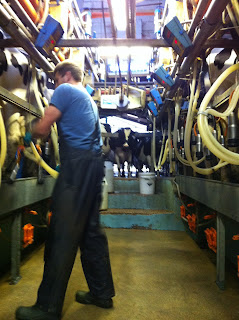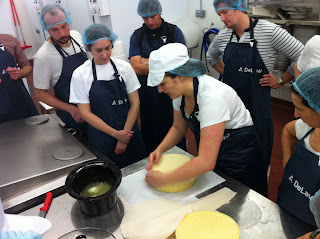Week 3
10th and 11th October - Dairy Introduction
Val Bines is a guru in the industry and what she doesn't know about the white stuff and what to do with it is not really worth knowing. First day was going through what milk is, the types and processes. This was followed by a tasting of milk... trying to differentiate between raw, pasturisted, semiskimmed, skimmed, UHT and Cravendale (pasturised & homogenised) is not an easy thing. Not surprisingly I only got the skimmed and semi-skimmed as those are the only drink. The afternoon was quickly setting of two lactic cheese (one with just lemon juice and one that had rennet) then off to taste cheese.
Clockwise from the:
Sparkenhoe Red Leicester (mmmm),
Berkswell (hard sheeps cheese - v nice),
Montgomery's (single herd, raw milk cheddar),
Appleby's Cheshire(I like a crumbly),
Mrs Kirkham's Lancashire (2 and 3 day curds and the best Lancashire I've tasted since I was a kid),
Swaildale (goat and good),
Tunworth (unpasterised soft and rather good!),
Wigmore (soft sheep and fantastic)
Stawley (lactic goats from somerset, very young)
Barkam Blue
Stichelton (raw cows and great)
The next day in the dairy was a real treat. As this is going to be my minor studies, we'll be covering most of what we did in much more detail so will not here... that and we haven't got the recipes yet. As well as the lactic cheese, we started a coulommier and a york/cambridge as well as the cheddars for next years graduation. Joy!
12th October - Estate tour
Again, we're not allowed to publish photos but we saw much more of the estate and plans for its future as well as being given some of the history - tunnels, underground ballrooms, chapels, the virgins corridor, biomass boilers, small businesses on the grounds,... and lots of stables. Amazing place. At times it felt like a sales pitch but great to see and know what your part of.
13th October - Health and Safety
Chartered institute for environmental health Level 2 Award in Health & Safety in the Workplace... thrilling. Theresa Tmlinson was good though. Lots of notes that probably need to be written up but not here. The exam seemed pretty straight forward though.
14th October - Chocolate
Ross Sneddon was great. Chocolate is not something I'd thought too deeply about previously (and didn't even know that it too is a fermented food) but to taste the real deal is very enlightening. I have to admit to feeling a bit sick by lunchtime and felt rather jittery most of the day but the ganache we made, like so many of these courses over the last couple of weeks, is remarkably simple and easy to do at home.































